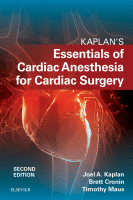Physical Address
304 North Cardinal St.
Dorchester Center, MA 02124

Key Points 1. Inadequate postoperative analgesia and/or an uninhibited perioperative surgical stress response has the potential to initiate pathophysiologic changes in all major organ systems, which may lead to substantial postoperative morbidity. Adequate postoperative analgesia prevents unnecessary patient discomfort, may…

Key Points 1. Cardiac surgical patients are at significant risk from preventable adverse events. These events occur through human error, by either faulty decision making (diagnosis, decision for treatment) or faulty actions (failure to implement the plan correctly). 2. Human…

Key Points 1. Despite a progressive decrease in cardiac surgical mortality, the incidence of postoperative neurologic complications has remained relatively unchanged over the decades. 2. The risk for stroke in patients undergoing coronary artery surgery increases progressively with increasing age,…

Key Points 1. Maintaining oxygen transport and oxygen delivery appropriately to meet the tissue metabolic needs is the goal of postoperative circulatory control. 2. Cardiac function worsens after cardiac surgical procedures. Therapeutic approaches to reverse this dysfunction are important and…

Key Points 1. Cardiac anesthesia has fundamentally shifted from a high-dose narcotic technique to a more balanced approach using moderate-dose narcotics, shorter-acting muscle relaxants, and volatile anesthetic agents. 2. This new paradigm has also led to renewed interest in perioperative…

Key Points 1. The key to successful weaning from cardiopulmonary bypass (CPB) is proper preparation. 2. After rewarming the patient, correcting any abnormal blood gases, and inflating the lungs, make sure to turn on the ventilator. 3. To prepare the…

Key Points 1. It is easiest to think of coagulation as a wave of biologic activity occurring at the site of tissue injury, consisting of initiation, acceleration, control, and lysis. 2. Hemostasis is part of a larger body system: inflammation.…

Key Points 1. Two predominant methods of blood propulsion are used: positive displacement roller pumps and constrained vortex centrifugal-type pumps. 2. Modern heart-lung machines are equipped with a number of alarm systems and redundant backup systems to overcome primary system…

Key Points 1. Cardiopulmonary bypass (CPB) is associated with a number of profound physiologic perturbations. The central nervous system, kidneys, gut, and heart are especially vulnerable to ischemic events associated with extracorporeal circulation. 2. Advanced age is the most important…

Key Points 1. Cardiac surgical patients are at significant risk from preventable adverse events. These events occur through human error, by either faulty decision making (diagnosis, decision for treatment) or faulty actions (failure to implement the plan correctly). 2. Human…